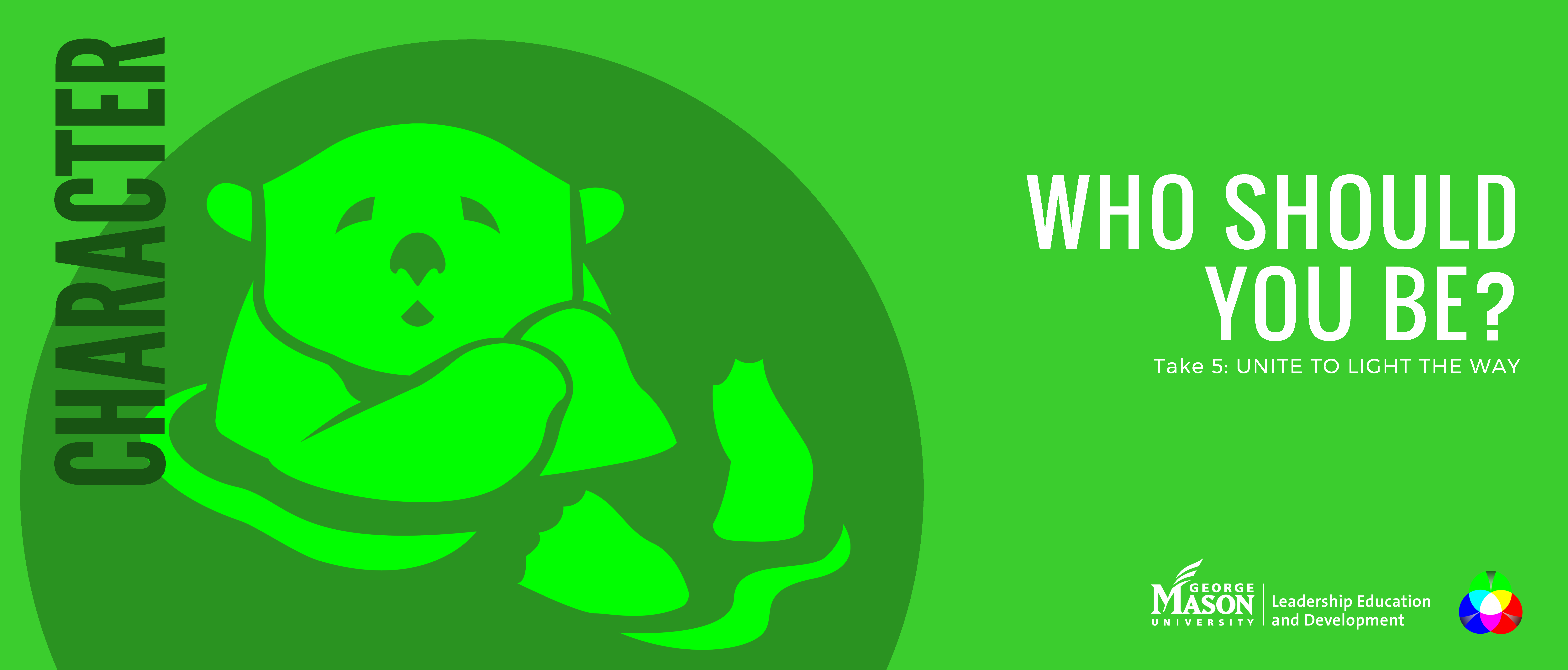

OLLY the OTTER. Focus Color: GREEN
Why read the information below?
1. Have a tough decision to make? Explore the strengths and challenges of this decision-making focus.
2. Discover the benefits of uniting different focus areas (colors/animals).
3. Practically apply these resources to make better decisions individually, and in groups. For example: use the FREE Take5 card (take5.gmu.edu/ethics-card), request a workshop (email: nlennon@gmu.edu), etc.
Why an Otter?
Olly, like many otters, is known for being intelligent, sociable, adaptable and curious. Olly and people who prefer the Character Focus are curious about the various personal characteristics that make someone a good person. They are adaptable as they seek to exemplify theses character traits. They are more interested in living in line with personal values than in set rules or calculating the results of specific actions. They care deeply about which personal characteristics they exhibit in order to be the type of people that they think they should be.
Why the Color Green?
Green is one of the 3 primary colors of light, just as the Character focus is typically seen as one of the 3 primary ethical focus areas of Moral Philosophy. Imagine that we have three flashlights that we shine in a dark room. Each one shines a different primary color of light (green, red and blue). If we overlap these three primary colors of light we get white light, which is the full spectrum of visible light. Using visible light as a metaphor, we can combine the three primary ethical focus areas (Green for “Character“, Red for “Code“, Blue for “Consequences“) in much the same way that we combine visible light. By combining the three primary ethical focus areas (i.e. three primary colors) we can benefit from the strengths of different focus areas while balancing out the weaknesses of any single focus area.
Main Consideration:
When deciding what’s right, Olly and others with a Character Focus tend to focus on some universal CHARACTER traits (e.g. compassion, fairness, honesty) that make someone a good person (or otter).
Question:
Like Olly, one of the main questions that drives people with a Character Focus is: “What kind of person (or otter) should I be?”, as opposed to only focusing on what actions they take. They care deeply about which personal qualities and characteristics they exhibit in order to be the type of person (or otter) they think they should be.
Strengths of the Character Focus:
1. MOTIVATION (CHARACTER MATTERS): Imagine that your friend gets sick and has to go to the hospital. You are able to safely go to visit them. They are so happy to see you and they ask “Why did you come to see me?” You have strong feelings for this friend, and a real sense of compassion for them, so you say: “You are my friend and I really like and care about you, of course I want to visit when you’re sick”. This seems very different than what motivated two of their other friends to visit. Their friend Hadley felt it was their duty to visit because they believe that they should do what they would want made into a principle for all to follow (e.g. visit friends who are suffering) (Hawk’s CODE). Their friend Whitley calculated the greatest good that they could do that day and they decided that visiting this friend would bring the best results and the least harm to others (Wolf’s CONSEQUENCES). Hadley’s and Whitley’s motivation both seem to be somewhat different than yours. The motivation behind the Character focus seems to include more of an emotional connection: friendship, love, compassion. Hadley and Whitley’s reasons and motivation seem a bit more calculated. Your focus on the character traits that make someone a good person (e.g. compassion, respect) and the personal qualities to strive for, can be a powerful strength. Many would argue that it’s very important to consider character traits and the type of motivation that they bring, not just the consequences of our actions or consistent codes/rules to follow.
2. RELATIONSHIPS: Imagine that you’re at an anti-racism demonstration one day and you see three people being attacked. To the right, your good friend is being attacked. To the left, two people that you don’t know are being attacked. You need to act quickly, you only have time to go in one direction, and you don’t have time to get additional help. Which way would you go? Would you decide to help your friend even though you would be helping (and potentially saving) just one person, instead of two? Because of your focus on character traits (e.g. being a responsible friend) you may decide that your personal relationship to your friend is a very important factor to consider. Those with a different main focus (e.g. Hawk’s Code, Wolf’s Consequences) often argue that we should be impartial and that it would be right to help more people instead of less. The Character focus accounts for the idea that it may be more right to be partial towards those we have a relationship with, like family and friends (e.g. protecting your own child). Other focuses have a harder time taking personal relationships into account. Being adaptable and taking into account personal relationships, and situational differences, when deciding what traits to exhibit, can be very important. (Note: other focus areas may see these as challenges, not strengths).
Challenges of the Character Focus:
1. WHICH TRAITS? Is it important to be courageous and loyal? Courage and loyalty may not always be ideal character traits. One could argue that the 9/11 terrorists showed courage by risking their lives for what they believed in, but courage for what ultimate purpose? One could argue that someone consistently acting in line with the beliefs of their preferred political party is being loyal, but blind loyalty can lead to some terrible decisions. A focus on character traits doesn’t necessarily help to clarify which character traits are actually the most important. To determine which traits are the most important, it may help to take other focus areas into account. For example, considering what the ultimate consequences of that trait might be in different circumstances (e.g. Wolf’s Consequences Focus).
2. WHAT ACTION? Let’s say that you highly value at least two character traits: honesty and compassion. What happens when these two important character traits conflict? Imagine that your friend gets an expensive haircut for a job interview, or a big date, and they seem to really like the haircut. You think it looks terrible, but they don’t have time to change it before the interview/date. They directly ask you what you think. You wonder: “… should I be directly honest with my friend, or say something that’s not completely true to protect my friend’s feelings and give them confidence?” Aren’t both honesty and compassion important? There are times when it is extremely difficult, or even impossible, to enact two conflicting character traits. Which should take precedence? You may say: “I would act based on how sensitive my friend is, considering the likely result of being fully honesty about how bad I think their haircut is”, but that would be incorporating a different focus (e.g. Wolf’s Consequences). A character focus doesn’t help us clarify what to do when two important traits conflict, it just focuses on the importance of character traits, not how to decide between them. In these situations, it can help to see things from a different focus (e.g. Hawk’s Code Focus, Wolf’s Consequences Focus).
Theoretical Background:
Virtue Ethics (based on the wisdom of philosophers such as Aristotle, Elizabeth Anscombe and others).
Conclusion:
Olly the Otter represents a very important and respected focus area (CHARACTER) from moral philosophy. However, this focus area does not include everything. To balance out the challenges above, Otter’s CHARACTER should be combined with other focus areas, like Hawk’s CODE and Wolf’s CONSEQUENCES. Combining focus areas is called PLURALISM and can be very beneficial.
Next Steps:
1. Remind yourself of the strengths and challenges of your main focus animal/color. This can help you anticipate benefits and identify potential problems down the road. For example, if someone only focuses on the Golden Rule: “How can I treat others how I/they would like to be treated?” (Bear’s Care focus) they may not hold someone accountable for their behavior because they would not want to be held accountable if they were in the other person’s situation, leading to a lack of fairness/justice.
2. Pick at least one other focus area (another animal/color) to read more about (see take5.gmu.edu/animals/). This can help you to better understand the strengths and challenges of different decision-making strategies. It can also help you to see the benefits of uniting the focus areas, since the different focus areas can build off of one another’s strengths and counteract one another’s challenges. This is why we say “Unite to light the way.”
3. Use the Take5 card (take5.gmu.edu/ethics-card/) to help you make well-balanced decisions (individually, and in groups). This card is practical, and action focused. Print it out or email nlennon@gmu.edu to request a card. Research shows that we all need reminders to make more ethical decisions.
4. Request a workshop. Email nlennon@gmu.edu to request a workshop to better understand these ideas and resources.
Handout:
To better understand this focus area, see the PDF Handout.
Overall Conclusion about the focus areas of the animals:
The Otter, Hawk, Wolf, Bear and Elephant represent very respected views from moral philosophy. We recommend combining the views of these 5 animals to balance out their strengths and weaknesses. For some tips on how to do this, please see the ethicspectrum page.
For George Mason University community members who would like to learn more, the Leadership Education and Development Office (LEAD) offers workshops and other programs on ethics and leadership topics. The workshop that directly addresses the ethics and leadership topics discussed on this website is called: “What Would You Do? Making Tough Ethical Choices.” Please see our general page at lead.gmu.edu or our workshop request page.

